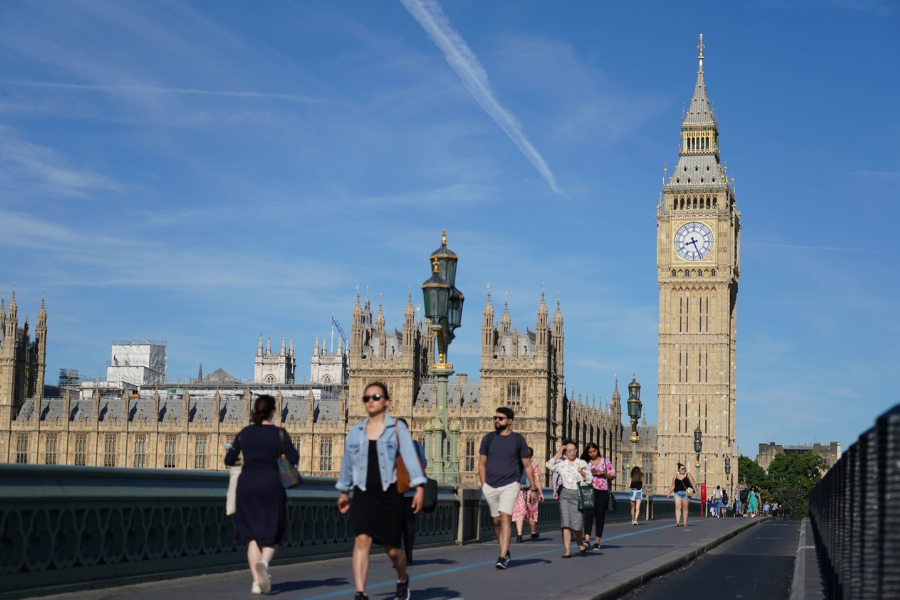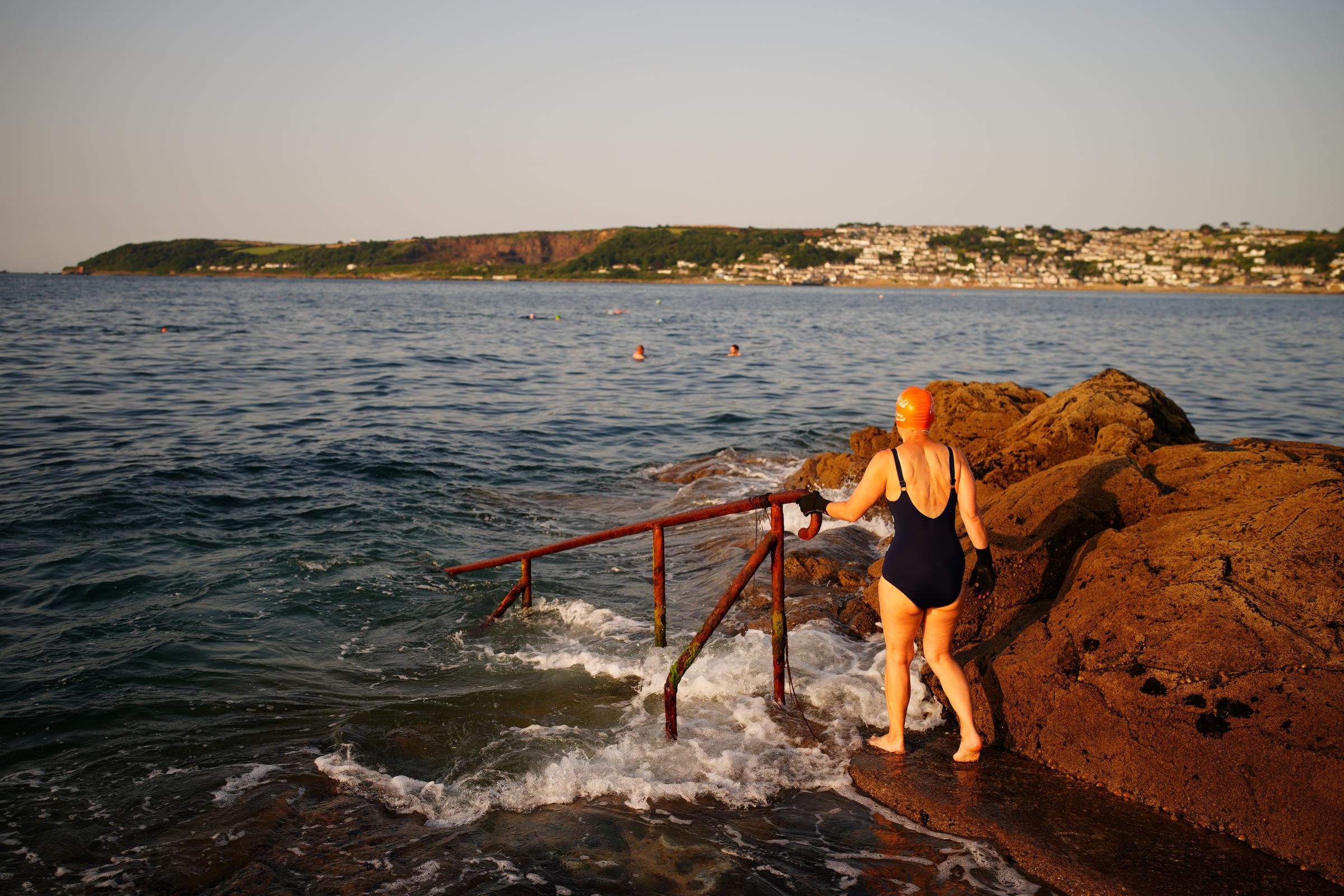
LONDON is predicted to be hotter than the Caribbean, the Western Sahara and popular European holiday spots as temperatures soar.
The Met Office has forecast the city could see highs of 38C when the unprecedented heatwave sweeps across England.
Most of Scotland will escape the worst of the climate-change fuelled heatwave, with temperatures reaching highs of 28C in Glasgow and 29C in Kelso today.
In the north, temperatures will be milder with Inverness and Aberdeen predicted for highs of 20C, while Edinburgh will reach 27C and Dundee experiencing 21C on Monday.
Commuters travelling by train have been warned to expect delays as speed restrictions are in place on key routes inside and outwith Scotland.
The rise in temperatures has forced the UK Health Security Agency to issue a level four heat-health alert – described as an “emergency” – while the Met Office has issued the UK’s first red extreme heat warning in England, with both running from Monday to Wednesday.
The city's scorching temperatures mean it will be warmer than Nassau in the Bahamas (32C), Kingston in Jamaica (33C), Malaga in Spain (28C), Athens in Greece (35C), Albufeira in Portugal (28C) and Dakhla, in the Western Sahara (24C)

Other areas of England will also experience warmer weather than the holiday destinations, with the Midlands predicted to see highs of 37C, East Anglia with 36C and the North West and North East with 33C.
It comes as new records were broken in Wales and Northern Ireland on Sunday.
Hawarden, a village in northern Wales, reached 33C while Armagh in Northern Ireland was 27.7C.
Tuesday is meanwhile predicted to be even hotter, with temperatures possibly reaching 40C – a new record for England.
Scientists at the Met Office have said the 40C prediction is a result of climate change, warning that the 40C figure “could be as much as 10 times more likely in the current climate than under a natural climate unaffected by human influence”.
Some schools in several counties, including Nottinghamshire and Hampshire, have confirmed they will close, while train companies urged people not to travel on Monday and Tuesday.
Network Rail confirmed train speeds would be restricted between 1pm and 8pm on Monday, which will have an impact on most routes, with a 20mph speed restriction on the stretch of rail between Hyndland and Finnieston in Glasgow, which is thought to be the busiest route in Scotland.
Restrictions will be in place between Glasgow Central and Edinburgh Waverley; Dumfries and Carlisle as well as Glasgow Queen Street and Aberdeen; Inverness; Oban and Fort William and Edinburgh Waverley and North Berwick, with delays of around 10 minutes expected, according to the ScotRail website.
Network Rail will close the East Coast Main Line between noon and 8pm on Tuesday for all locations between London King’s Cross and York and Leeds, with passengers warned not to travel.
The West Coast line between Glasgow and London remains in operation.
☀️ The next couple of days are set to be exceptionally hot. Please take care and follow sensible advice - keep out of direct sun; stay well hydrated; and look out for others who may be suffering from the heat. https://t.co/ecOyCxpMXy
— Nicola Sturgeon (@NicolaSturgeon) July 17, 2022
Sam MacDougall, operations director for Network Rail said: “Closing the line to traffic is always a last resort but it is the right thing to do to keep people safe on Tuesday given the unprecedented heatwave forecast.
“The forecast temperatures are well above those which our infrastructure is designed for, and safety must come first.”
Network Rail confirmed train speeds would be restricted between 1pm and 8pm on Monday, which will have an impact on most routes, with a 20mph speed restriction on the stretch of rail between Hyndland and Finnieston in Glasgow, which is thought to be the busiest route in Scotland.
Restrictions will be in place between Glasgow Central and Edinburgh Waverley; Dumfries and Carlisle as well as Glasgow Queen Street and Aberdeen; Inverness; Oban and Fort William and Edinburgh Waverley and North Berwick, with delays of around 10 minutes expected, according to the ScotRail website.
Additional contingency support for ambulance services, such as more call handlers and extra working hours, have been put in place while the chairman of the NHS Confederation said hospitals are going to be “really, really pushed” over the next few days.
People are being urged to stay inside during the hottest points of the day - between 11am and 4pm - and to wear sun cream and a hat, stay in the shade and keep hydrated.
Dr Nikos Christidis, a climate attribution scientist at the Met Office, said the unprecedented temperatures were linked to climate change and warned even higher temperatures could become the norm.
He added: “The likelihood of exceeding 40C anywhere in the UK in a given year has also been rapidly increasing, and, even with current pledges on emissions reductions, such extremes could be taking place every 15 years in the climate of 2100.”
First Minister Nicola Sturgeon warned Scots to stay safe in the heat, tweeting: “The next couple of days are set to be exceptionally hot.
“Please take care and follow sensible advice - keep out of direct sun; stay well hydrated; and look out for others who may be suffering from the heat.”







